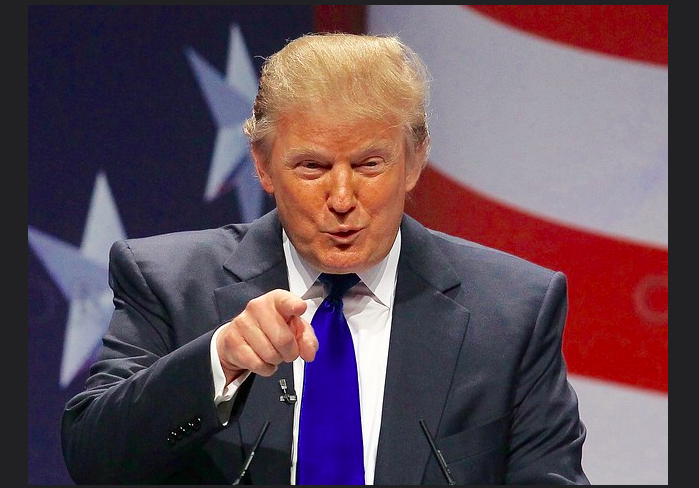Quid pro quo (“something for something” in Latin) is a Latin phrase used in English to mean an exchange of goods or services, in which one transfer is contingent upon the other; “a favour for a favour”.
How the United States President Donald Trump hijacked his impeachment process with ” no quid pro quo.”
It is certainly true that “no quid pro quo” fits nicely as a slogan, even if it doesn’t exactly roll off the tongue.
[spacer height=”20px”]
Trump seeks another quid pro quo?
NO.
If CONGRESS won't #FundUSPS per its constitutional duty,#GeneralStrike#ConsumerBoycott#ShutItDown
Bottom line IS bottom line in US.
From bottled water to tactical gear, protesters SPEND >> govt/rich HIRE/BUY more security.#StarveTheBeast https://t.co/ztCB3g3HbX— ImplausibleEndeavors (@MindOfMo) August 14, 2020
The term doesn’t appear in the whistleblower complaint that set the entire impeachment inquiry in motion.
It doesn’t appear in the Constitution, which lays out the impeachment process as punishment for “Treason, Bribery, or other high Crimes and Misdemeanors.”
It’s not in the Federalist Papers, where Alexander Hamilton expanded on what those crimes might be, quite simply as “the abuse or violation of some public trust.”
It didn’t appear in the initial news stories about the complaint, either, such as when The Washington Post reported on September 18 that it had been triggered by Trump’s interaction with a world leader.
[spacer height=”20px”]
[spacer height=”20px”]
Quid pro quo is a Latin term that means “something for something,” as CNN’s Veronica Stracqualursi wrote last month. It’s often used in the legal world, but since it is not directly tied to impeachment in the Constitution or anywhere else, it’s not the question lawmakers will have to decide if they draw up articles of impeachment against Trump and hold a trial in the Senate on whether to remove him from office.
[spacer height=”20px”]
It could be an element of Hamilton’s violation of the public trust, but the exchange of things of value is not required in order to be found guilty of high crimes and misdemeanors.
[spacer height=”20px”]
The idea of quid pro quo with regard to Trump and Ukraine emerged on his terms. The Wall Street Journal used the term September 20, when it reported that Trump had pressured Ukrainian President Volodymyr Zelensky seven or eight times to investigate Joe Biden’s son Hunter. But the context of that usage is important.

[spacer height=”20px”]
“Mr. Trump in the call didn’t mention a provision of U.S. aid to Ukraine, said this person, who didn’t believe Mr. Trump offered the Ukrainian president any quid pro quo for his cooperation on any investigation,” wrote the Journal’s reporters.
[spacer height=”20px”]
[spacer height=”20px”]
According to a search of the Factba.se database, Trump himself first used the term publicly a few days later, talking to reporters outside the White House on September 22.
[spacer height=”20px”]
[spacer height=”20px”]
[spacer height=”20px”]
In his opening statement to impeachment investigators
Tuesday, Bill Taylor, the top US official in Ukraine, used the term “quid pro quo” to describe what Trump said he was not asking for.
[spacer height=”20px”]
“According to Mr. Morrison, President Trump told Ambassador Sondland that he was not asking for a ‘quid pro quo,’
” Taylor wrote in his statement, referring to National Security Council official Tim Morrison and US Ambassador to the European Union Gordon Sondland, before making clear that Trump certainly had expectations of what Zelensky should do.
“But President Trump did insist that President Zelenskyy go to a microphone and say he is opening investigations of Biden and 2016 election interference, and that President Zelenskyy should want to do this himself.”
[spacer height=”20px”]
see also : Trump backs push for Bible Study in Schools
[spacer height=”20px”]
The next day, Taylor testified, in a phone call between Sondland and him, the idea came up again in terms of what Trump says he is not doing.
Paraphrasing Sondland, Taylor wrote, “President Trump was adamant that President Zelenskyy, himself, had to ‘clear things up and do it in public.’ President Trump said it was not a ‘quid pro quo.’ ”
[spacer height=”20px”]
“I’ve been in there for 10 hours, I can assure you there’s no quid pro quo,” Rep. Mark Meadows, a North Carolina Republican, said Tuesday on the sidelines of Taylor’s closed-door testimony.
A former Republican congressman from Pennsylvania who opposes Trump, Charlie Dent, said there’s plenty of evidence of quid pro quo, no matter what you call it.
Fact Check
We strive for accuracy and fairness. If you see something that doesn’t look right, contact us!
Thanks for reading and remember to share this post on social media

